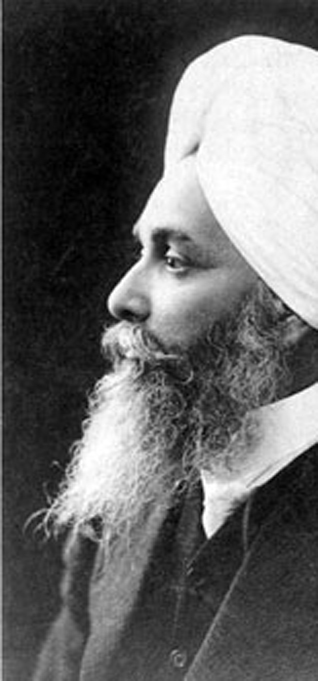Books
Let Us Talk About Your Book:
Arvind Pal Singh Mandair -
Part XI
Q & A with Author by SIKHCHIC.COM
Continued from last week ...
[Previous segments of this series can be found in the BOOKS Section of sikhchic.com]
Q This may be a good time to get to the Singh Sabha Movement itself. Can you please spell out for me, in as simple terms as possible, your stance on it?
A What I actually do in chapters 3 and 4 of “Religion & The Specter of The West” is to unravel the mechanisms by which Singh Sabha scholars make indigenous categories equivalent to Western categories and then use the power of Christian metaphysics to combat their Hindu opponents.
I undertake close readings of texts in English and Punjabi, and focus on the philosophical moves behind the translative process and the politics that underpins it. By doing this I allow the work of metaphysics to become visible to the reader, whereas previously they were hidden under the cover of ideology.
The technical term for this kind of reading which exposes the deceptions of metaphysics is ‘deconstruction’ which is just one of many different varieties of critical reasoning, critical thinking or critique.
Now it is important to note that neither ‘deconstruction’ nor ‘critique’ are actually as negative as they sound. In reality, both of these terms refer to modes of reasoning that destabilize structures (especially social structures) that give the illusion of permanence, of absolute fixity, but in fact are man-made. It applies only to positions, structures, entities that are entirely man-made but pretend to have a divine origin and therefore claim to be beyond study or reformulation.
Remember, from what I said earlier, that is how metaphysics works. It reduces the natural world into an illusion that we must escape from, and pretends to be the work of God. But all along it is the human ego that is the doing the real work.
The motivation comes from the human ego. Deconstruction exposes this deceitful mechanism and returns our attention to the world that we live in. And by doing this it exposes the inequalities that are created by dominating forces.
The term ‘critical’ as I use it signifies the mental activity of discerning the limits and limitations of a particular position or discourse.
Now, it may not be obvious to most people (especially when I use this kind of abstract language - deconstruction, critique, etc), but it is possible to think of Sikh tradition as already deploying similar modes of reasoning even in our Gurdwara discourses. The best kathakaars (oral exegetes) have long had a very keen sense for judging when Sikhs are falling back into static ritualisms or coming under the influence of powerful external forces that might be harmful to the basic precepts of Sikhi.
A good example might be the influence of false gurus or dera babas who pretend to have some kind of a divine status. It is not uncommon to find Sikh kathakaars using modes of critical discernment to show an unsuspecting public the truth of a situation.
In a way, that is pretty much what I am doing in my study of the Singh Sabha scholars and the discourse they created in the early 20th century. The only difference is that I apply tools of the Western academy to my work.
And the reason I use Western tools is that the discourse of the Singh Sabha itself developed through the encounter with European Orientalists and missionaries.
Q Was that, or is that, good or bad?
A Well, what the Singh Sabha scholars did was to create a new kind of discourse by borrowing from Western metaphysical frameworks (especially Protestant Christian theology).
What I am doing in chapter 3 especially is showing readers the LIMITS of this approach, that is, of the Singh Sabha scholars’ discourse.
That is how critique works. That is the function of critique: to show the limits of a particular discourse. Once you have shown these limits (which are also limitations, a horizon beyond which they cannot go) I then ask my readers to choose:
Do you want to retreat back into this position, which is limited because it is now outdated? It may have worked a century ago for the Singh Sabha, but it no longer works in the same way and with the same power as it once did. It no longer guarantees the same security.
Or do you wish to create a new position, a better position more conducive to the world we live in today?
This brings me to my own stance.
It should be obvious to anyone reading the book, and to anyone who is not driven by fanaticism or plain resentment, that I see myself as both a product and an inheritor of the Singh Sabha project. Like the early Singh Sabha scholars I totally accept the centrality of Guru Granth-Guru Panth or shabad-guru and the Khalsa.
Forgive me for saying this, but one would have to be plain stupid, or malicious, or perhaps both at once, not to see my positioning on this ... It is clear as day.
However, unlike the early Singh Sabha, I am also a product of the Sikh diaspora and, as such, a product of the West, intellectually and existentially. In fact, as I said earlier, no one is immune to the West, not even the humble Punjabi farmer who quietly tills the soil, or even the greatest Punjabi literati.
The only way you can avoid the West today is by retreating into some kind of Romanticism.
Continued next week ...
April 1, 2014
Conversation about this article
1: Bhai Harbans Lal (Dallas, Texas, USA), April 10, 2014, 2:38 AM.
Very interesting hypothesis. Looking forward to reading more.



